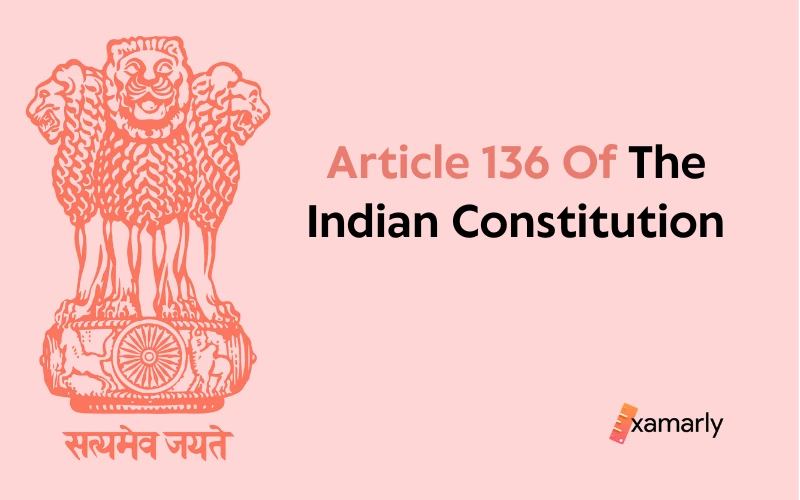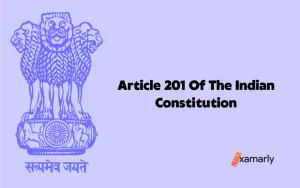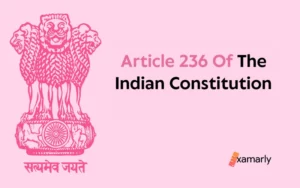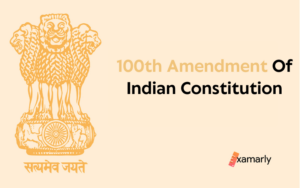The duties, authority, and powers of the Supreme Court of India and the nature of jurisdiction are outlined in Chapter IV, “The Union Judiciary,” of Part V of the Indian Constitution. A person may not be happy with the decision made by the High Court of a certain state for a variety of reasons. Article 136 of the Indian Constitution may serve as a remedy in these circumstances.
The Supreme Court’s unusual leave to appeal is covered in Article 136. It implies that any judgment rendered by a court or tribunal may be contested inside Indian territory. The decision to grant exceptional leave is up to the Supreme Court (except for military tribunal and court-martial).
This piece of information is helpful in comprehending the meaning of Article 136 and is beneficial for the preparation of UPSC CSE as it is a part of the Indian Polity of IAS Syllabus.
- What Is Article 136 Of The Indian Constitution?
- Article 136 A Constitutional Right
- Breadth Of authority Granted To The Supreme Court By Article 136
- Landmark Judgements
- Smt. Tej Kumari v. CIT
- Tirupati Balaji Developers Pvt. Ltd. Vs. State Of Bihar AIR 2004
- Jamshed Hormusji Wadia v. Board Of Trustees, Port Of Mumbai
- N. Suriyakala v. A. Mohandoss & Others
- What Distinguishes The Indian Constitution's Articles 136 From Articles 132-135?
- Key Points
- Conclusion
- FAQs On Article 136
- What Is The Origin Of Special Leave?
- Who Had the Authority To Grant Special Leave From Any Civil Or Criminal Issue Prior To The Constitution?
- Who Can File SLP?
- What Is Special Leave Petition?
- How Article 136 Proves To Be A Remedy?
- What Does Question Of Law Means?
- For The Violation Of Fundamental Rights, Can A Special Leave Petition Be Filed With The Supreme Court?
- In Which Part Of the Constitution Article 136 Is Contained?
What Is Article 136 Of The Indian Constitution?
The Supreme Court, India’s highest court, has been given a special jurisdiction, according to Article 136 of the Indian Constitution. The said article only applies to judicial decisions. The constitutional provisions of Article 136 are mentioned below.
- Despite the provisions of this Chapter, the Supreme Court may, at its discretion, grant special leave to appeal any judgment, decree, resolution, sentence, or order made by any court or tribunal within the Indian territory in any case or matter.
- Nothing in clause (1) shall be applicable to any ruling, decision, sentence, or order rendered by a court or tribunal established by or operating under a law pertaining to the Armed Forces.
Article 136 A Constitutional Right
Additionally, the SC had claimed that the remedy provided for in Article 136 (Special Leave Petition) is a constitutional right. Therefore, the barrier can be circumvented by following one of the potential paths outlined in Articles 32, 131, or 136 of the Constitution.
- In accordance with Article 32 of the Constitution, there are writs for Habeas Corpus, Mandamus, Prohibition, Certiorari, and Quo warranto that can be used to preserve constitutional rights.
- Center-State or inter-State issues are generally covered by Article 131 (Original jurisdiction of the Supreme Court).
Breadth Of authority Granted To The Supreme Court By Article 136
The Supreme Court of India has “discretionary power,” according to the Indian Constitution. The Supreme Court of India has the ability to grant special leave to appeal any decision, decree, or order rendered by any court or tribunal within the Indian subcontinent in any case. By using its discretion, the Supreme Court of India may also decide not to grant leave to appeal.
A party that has been wronged by a high court decision or decree cannot request special leave to appeal as a matter of right; rather, this is a prerogative that can only be used by the Supreme Court of India.
In the event that there is a constitutional or legal question that the Supreme Court of India can resolve, an aggrieved party may file a petition with the Apex Court under Article 136. Depending on the circumstances, this may be reviewed as a civil or criminal appeal.
Landmark Judgements
The decisions of courts in the following mentioned cases are discussed below:
Smt. Tej Kumari v. CIT
In Smt. Tej Kumari v. CIT (2000), it was decided that when a special leave petition is denied, the court makes no judgments about whether the order from which leave to appeal is requested is right or wrong. When a plea for special leave is denied under Article 136, the doctrine of merger does not apply.
Tirupati Balaji Developers Pvt. Ltd. Vs. State Of Bihar AIR 2004
This Court noted that Article 136 is an “extraordinary jurisdiction” granted by the Constitution to the Supreme Court with implicit confidence and faith and that it must be exercised with unusual care and caution. The court further pointed out that while Article 136 grants the Supreme Court broad discretion to be used in the interests of justice, duty, and eliminating injustice, it does not grant a party the right to appeal.
Jamshed Hormusji Wadia v. Board Of Trustees, Port Of Mumbai
The Supreme Court is only required to use its authority under Article 136 in exceptional circumstances, such as when a question of law of public significance arises, as was decided in the case of Jamshed Hormusji Wadia v. Board of Trustees, Port of Mumbai (2005).
N. Suriyakala v. A. Mohandoss & Others
According to the ruling in N. Suriyakala v. A. Mohandoss & Ors. (2007), Article 136 of the Constitution is not a typical forum for appeal at all. The court has the right to intervene in order to use its discretionary authority under the Article. It simply grants the Supreme Court a wide range of discretionary power to be used for upholding the demands of justice; it does not grant any parties to the dispute the ability to appeal.
What Distinguishes The Indian Constitution’s Articles 136 From Articles 132-135?
- Only appeals against final orders may be heard by the supreme court under Articles 132 to 135 of the Constitution. However, under Article 136, the phrase “order” is not qualified by the adjective “final,” so the court may issue special leave to appeal even from an interlocutory order.
- In accordance with Articles 132 to 134, a high court’s final decision is the only decision that is subject to appeal; but, under Article 136, the supreme court may give special leave to appeal from any court or tribunal, i.e., from any lower court than the high court, even if the appeal is not filed in accordance with the ordinary procedure in the high court or the applicable law does not provide for such an appeal.
- In accordance with Articles 132 to 134, the supreme court may hear an appeal only in relation to a decision, ruling, sentence, or order of a court or tribunal; but, under Article 136, an appeal may be brought in relation to any case or subject matter.
Check out the linked articles from the table mentioned below to learn not only about Articles 132-135 but also other articles on Indian Polity.
Key Points
- The Constituent Assembly debates about Draft Article 112 (Article 136) on 6 June 1949 and 16 October 1949. It was stated who had the power to grant special leave to appeal.
- Compared to that provided by Article 134A, the authority afforded by Article 136 is more significant.
- The Supreme Court can hear an appeal after the High Court issues a certificate of fitness in accordance with article 134A.
- The Supreme Court made it plain that this authority should only be used in special circumstances in the Pritam Singh v. State decision.
- The ability to give special leave falls under this.
- The court’s exclusive authority comes from its own discretion.
- The court has the authority to exercise this discretion in the event that the fundamental standards of justice have been breached and the lower court has made an error by failing to follow the law and the parties.
- Because there is no acknowledged rule that establishes when the authority conferred by Article 136 may or may not be employed.
- In this case, the Supreme Court has discretion.
- The SC must first exercise discretion when deciding whether to grant or deny the requested Special Leave in the event of any SLP.
- It is crucial to comprehend the SLP’s position with regard to the rulings of the Inter-State Water Dispute (ISWD) Tribunal when talking about them.
- The SC is not permitted to hear or decide any appeals against the Inter-State Water Dispute (ISWD) Tribunal’s ruling under the Inter-State Water Disputes Act of 1956 or Article 262 (2) of the Constitution.
- The ISWD Tribunals appear to be under the ambit of Article 136, which refers to “any Court or tribunal in the territory of India.”
Conclusion
Special leave petitions give the Supreme Court residual power. The decision of whether or not to grant such a petition rests with the court. The Supreme Court Rules’ specified limitation period must be followed while filing an SLP. If the lower court did not take into account certain information or did not reach a fair decision, special leave petitions are granted to ensure that justice is served. Both civil matters and criminal cases are eligible for special leave applications, but the Supreme Court must decide criminal matters with particular caution and skill. Unless there has been a court violation of due process, the Supreme Court should not get involved.
FAQs On Article 136
What Is The Origin Of Special Leave?
The expression special leave to appeal under Article 136(1) of the Constitution was adopted by the framers of the Government of India Act, 1935 (hereinafter referred to as “the 1935 Act or the said Act” as the case may be).
Who Had the Authority To Grant Special Leave From Any Civil Or Criminal Issue Prior To The Constitution?
Before the Constitution of India was enacted, the Privy Council was vested with the authority to grant exceptional leave from any civil or criminal action that had been adjudicated by a court in India.
Who Can File SLP?
Any aggrieved person who feels wronged by a decision or order of refusal of grant of certificate of fitness for appeal may file an SLP against it. The Supreme Court of India will consider a Special Leave Petition when a substantial question regarding the Indian Constitution is concerned or when there has been a grievous miscarriage of justice.
What Is Special Leave Petition?
The term “Special Leave Petition” (SLP) has a prominent place in Indian law. A special leave petition gives the aggrieved party special power to challenge any decision, decree, order, resolution, or sentence made by the court or tribunal inside the Indian subcontinent in the Apex court. Cases handled by a military court or court-martial do not require a special leave petition. The UK Constitution served as the inspiration for this exception.
How Article 136 Proves To Be A Remedy?
There are a variety of factors that could lead to an individual becoming dissatisfied with the decision that was rendered by the state’s highest court. Article 136 of the Indian Constitution is a potential solution for situations like these that may arise. Appeals governed by Article 136 are handled by the Indian Supreme Court.
What Does Question Of Law Means?
Any legal issue that needs to be resolved by the judge using legal standards is referred to as a question of law. In the event that the Supreme Court denies the special leave petition by a speaking or non-speaking order, it cannot leave the question of law open or unresolved for future deliberation. When the petition is denied, the Supreme Court’s discretionary jurisdiction under Article 136 comes to an end.
For The Violation Of Fundamental Rights, Can A Special Leave Petition Be Filed With The Supreme Court?
No, a petition for special leave to appeal to the Supreme Court because of an alleged violation of basic rights cannot be lodged. Under Article 32 of the Indian Constitution, a writ petition must be submitted to challenge the violation of basic rights.
In Which Part Of the Constitution Article 136 Is Contained?
Chapter IV of Part V of the Constitution of India speaks about Article 136. The Supreme Court has the authority to hear appeals by grant of special permission against any judgment or order made by any Court or tribunal in the nation thanks to the residuary provision under Article 136.






